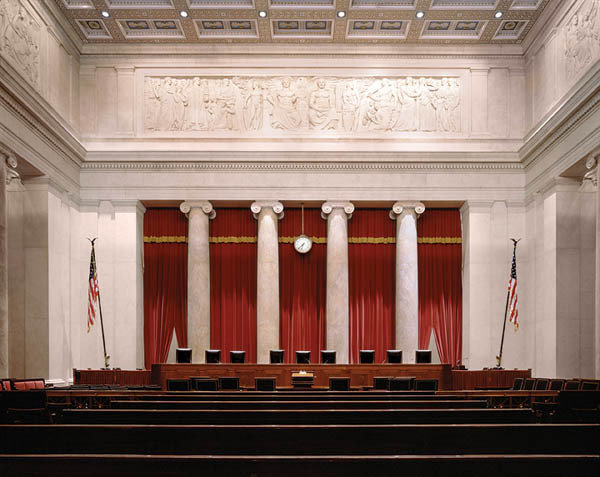The U.S. Supreme Court ruling on Friday limiting federal judges’ ability to temporarily block President Trump’s executive orders ultimately may do little for enforcement of his birthright citizenship order, but it may enhance his and future presidents’ enforcement of executive policies.
 The 6-3 conservative majority, in an opinion by Justice Amy Coney Barrett, ruled that so-called universal, or nationwide injunctions, which prohibit an actor, such as the president, from taking action against anyone, lack a historical pedigree and fall outside of the federal court’s authority under the Judiciary Act of 1789.
The 6-3 conservative majority, in an opinion by Justice Amy Coney Barrett, ruled that so-called universal, or nationwide injunctions, which prohibit an actor, such as the president, from taking action against anyone, lack a historical pedigree and fall outside of the federal court’s authority under the Judiciary Act of 1789.
“Nothing like a universal injunction was available at the founding, or for that matter, for more than a century thereafter,” Barrett wrote. “Thus, under the Judiciary Act, federal courts lack authority to issue them.” Instead, federal courts can only issue injunctions that provide complete relief to the parties before them, she said.
Presidents of both political parties have criticized nationwide injunctions when their policies have been thwarted by them. Those policies have included vaccine mandates, immigration, abortion, census questions, and aid to Black farmers, among others.
The Supreme Court ruling came in three cases in which district court judges in Maryland, Washington and New Jersey issued preliminary injunctions pausing Trump’s executive order narrowing who is eligible for birthright citizenship in the United States. The controversial and contested executive order contravenes a century of interpretation of the Constitution’s Citizenship Clause, which makes every child a citizen, with few exceptions, who is born within the jurisdiction of the United States.
After Trump’s executive order was blocked, his administration turned to the Supreme Court. It asked the Justices to limit the effect of the three injunctions only to the parties that originally challenged the order. Trump’s lawyers did not ask the Justices to rule on whether the order itself was constitutional, and the Justices did not resolve that question. (There are no pending cases in the Supreme Court on the constitutional issue, but the justices may see one or more next term.)
The Supreme Court’s decision is effective in 30 days. That means, if nothing changes, in 30 days, the original plaintiffs in the Maryland, Washington and New Jersey challenges are basically protected by injunctions, but Trump’s birthright citizenship order is effective in the rest of the country…UNLESS…
Barrett wrote that the analysis is more complicated because of the states that challenged the order.
“As the States see it, their harms—financial injuries and the administrative burdens flowing from citizen-dependent benefits programs—cannot be remedied without a blanket ban on the enforcement of the Executive Order,” she explained. “Children often move across state lines or are born outside their parents’ State of residence. Given the cross-border flow, the States say, a ‘patchwork injunction’ would prove unworkable, because it would require them to track and verify the immigration status of the parents of every child, along with the birth State of every child for whom they provide certain federally funded benefits.”
But Barrett said the court would leave it to the lower courts to determine whether a narrower injunction would be appropriate.
Another alternative to nationwide injunctions, according to the majority and others, is a nationwide class action. Class actions are governed by a federal rule that requires, for example, common questions of law and facts by members of the class, and representatives of the parties who can protect the interests of the class. Class actions are not always easily approved and may be expensive to mount.
However, that alternative did not satisfy the dissenters led by Justice Sonia Sotomayor and joined by Justices Elena Kagan and Ketanji Brown Jackson. Jackson wrote a separate dissent as well.
“No right is safe in the new legal regime the Court creates,” Sotomayor wrote. “Today, the threat is to birthright citizenship. Tomorrow, a different administration may try to seize firearms from law-abiding citizens or prevent people of certain faiths from gathering to worship. The majority holds that, absent cumbersome class-action litigation, courts cannot completely enjoin even such plainly unlawful policies unless doing so is necessary to afford the formal parties complete relief.”
However, the parties to the Maryland challenge moved almost immediately after the Supreme Court decision was issued to amend their lawsuit and to seek certification of a class of “all children who have been born or will be born in the United States on or after February 19, 2025, who are designated by Executive Order 14,160 to be ineligible for birthright citizenship, and their parents.” They also have asked the district court for an emergency class-wide temporary restraining order and preliminary injunction.
Without nationwide injunctions, class actions are the likely legal strategy going forward for many of those challenging Trump’s various executive orders and policies. By one estimate, more than two-dozen nationwide injunctions currently block some of his policies, and after the Supreme Court ruling, Trump said his lawyers now will go back and seek to narrow those injunctions as well.
Marcia Coyle is a regular contributor to Constitution Daily. She was the Supreme Court Correspondent for The National Law Journal and PBS NewsHour who has covered the Supreme Court for more than three decades.







